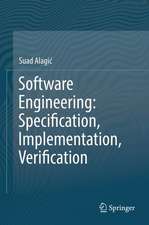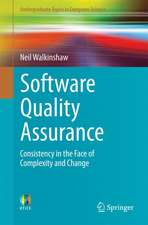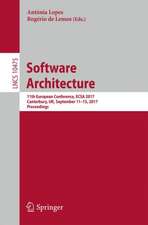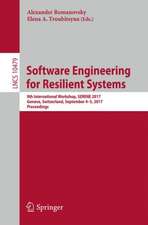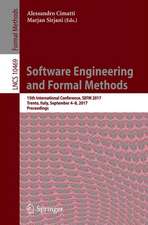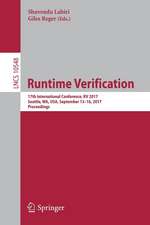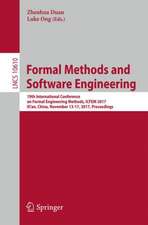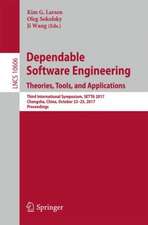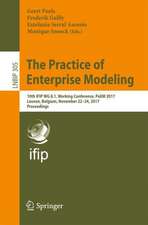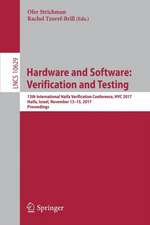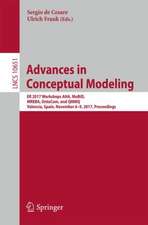Early Software Reliability Prediction: A Fuzzy Logic Approach: Studies in Fuzziness and Soft Computing, cartea 303
Autor Ajeet Kumar Pandey, Neeraj Kumar Goyalen Limba Engleză Hardback – 24 iul 2013
| Toate formatele și edițiile | Preț | Express |
|---|---|---|
| Paperback (1) | 639.52 lei 43-57 zile | |
| Springer India – 7 aug 2015 | 639.52 lei 43-57 zile | |
| Hardback (1) | 645.79 lei 43-57 zile | |
| Springer India – 24 iul 2013 | 645.79 lei 43-57 zile |
Din seria Studies in Fuzziness and Soft Computing
- 20%
 Preț: 999.85 lei
Preț: 999.85 lei - 20%
 Preț: 653.06 lei
Preț: 653.06 lei - 20%
 Preț: 872.96 lei
Preț: 872.96 lei - 20%
 Preț: 930.57 lei
Preț: 930.57 lei - 20%
 Preț: 1051.00 lei
Preț: 1051.00 lei - 20%
 Preț: 992.44 lei
Preț: 992.44 lei - 20%
 Preț: 655.85 lei
Preț: 655.85 lei - 20%
 Preț: 1001.86 lei
Preț: 1001.86 lei - 18%
 Preț: 954.14 lei
Preț: 954.14 lei - 20%
 Preț: 330.10 lei
Preț: 330.10 lei - 20%
 Preț: 333.04 lei
Preț: 333.04 lei - 20%
 Preț: 997.56 lei
Preț: 997.56 lei -
 Preț: 391.61 lei
Preț: 391.61 lei - 20%
 Preț: 647.79 lei
Preț: 647.79 lei - 20%
 Preț: 986.01 lei
Preț: 986.01 lei - 18%
 Preț: 958.56 lei
Preț: 958.56 lei - 20%
 Preț: 996.40 lei
Preț: 996.40 lei - 20%
 Preț: 999.35 lei
Preț: 999.35 lei - 15%
 Preț: 646.43 lei
Preț: 646.43 lei - 20%
 Preț: 651.57 lei
Preț: 651.57 lei - 20%
 Preț: 997.89 lei
Preț: 997.89 lei - 15%
 Preț: 641.03 lei
Preț: 641.03 lei - 20%
 Preț: 1009.74 lei
Preț: 1009.74 lei - 20%
 Preț: 992.62 lei
Preț: 992.62 lei -
 Preț: 388.72 lei
Preț: 388.72 lei - 18%
 Preț: 1223.43 lei
Preț: 1223.43 lei - 20%
 Preț: 651.42 lei
Preț: 651.42 lei - 18%
 Preț: 951.59 lei
Preț: 951.59 lei - 18%
 Preț: 948.61 lei
Preț: 948.61 lei
Preț: 645.79 lei
Preț vechi: 807.24 lei
-20% Nou
Puncte Express: 969
Preț estimativ în valută:
123.57€ • 129.35$ • 102.85£
123.57€ • 129.35$ • 102.85£
Carte tipărită la comandă
Livrare economică 31 martie-14 aprilie
Preluare comenzi: 021 569.72.76
Specificații
ISBN-13: 9788132211754
ISBN-10: 8132211758
Pagini: 176
Ilustrații: XIX, 153 p.
Dimensiuni: 155 x 235 x 15 mm
Greutate: 0.43 kg
Ediția:2013
Editura: Springer India
Colecția Springer
Seria Studies in Fuzziness and Soft Computing
Locul publicării:New Delhi, India
ISBN-10: 8132211758
Pagini: 176
Ilustrații: XIX, 153 p.
Dimensiuni: 155 x 235 x 15 mm
Greutate: 0.43 kg
Ediția:2013
Editura: Springer India
Colecția Springer
Seria Studies in Fuzziness and Soft Computing
Locul publicării:New Delhi, India
Public țintă
ResearchCuprins
Introduction.- Backgrounds: Software Quality and Reliability Prediction.- Early Fault Prediction using Software Metrics and Process Maturity.- Multistage Model for Residual Fault Prediction.- Prediction and Ranking of Fault-prone Software Modules.- Reliability Centric Test Case Prioritization.- Software Reliability and Operational Profile.- Appendices.- References.
Notă biografică
Dr. Ajeet Kumar Pandey is currently associated with AECOM India Private Limited, supporting RAM analysis of L&T Metro Rail, Hyderabad (India), one of the major public-private partnership (PPP) projects. He is also taking guest lectures, on invitation, at Indian Institute of Management Raipur, Raipur, India. He has more than 12 years of professional and research experience. He worked as a Sr. Research Fellow at IIT Kharagpur, Kharagpur, India, Sr. RAMS Engineer at Cognizant Technology Solutions, Hyderabad, India, and Sr. Systems Officer at UPTEC, Lucknow, India. Dr. Pandey received his Ph.D. in Reliability Engineering from Indian Institute of Technology Kharagpur, Kharagpur, India 2011. Prior to this, he did his M. Tech. from Motilal Nehru National Institute of Technology, Allahabad, India. His major areas of research are software engineering and project management; data mining; software metrics, software quality and testing; reliability analysis and prediction; hazard analysisand system safety; and handling compliance and regulatory issues of safety critical systems. He has also been involved with academics and has taught subjects like Operating System, Operational Research, Software Engineering, Data Mining & Business Intelligence, etc., to Undergraduate and Postgraduate students. He has also contributed several research papers to international journals and conference proceedings.
Dr. Neeraj Kumar Goyal is currently an Assistant Professor in Reliability Engineering Centre, Indian Institute of Technology Kharagpur, India. He has received his Ph.D. degree from IIT Kharagpur in Reliability Engineering in 2006. His Ph.D. topic was ‘On Some Aspects of Reliability Analysis and Design of Communication Networks’. He received the Bachelor of Engineering degree with Honors in Electronics and Communications Engineering from MREC Jaipur, Rajasthan, India in 2000. His areas of research and teaching are network reliability, software reliability, electronic system reliability, reliability testing, probabilistic risk/safety assessment, and reliability design. He has completed various research and consultancy projects for various organizations, e.g. DRDO, NPCIL, Vodafone, ECIL etc. He has contributed several research papers to international journals and conference proceedings. He is also associate editor of International Journal of Performability Engineering.
Dr. Neeraj Kumar Goyal is currently an Assistant Professor in Reliability Engineering Centre, Indian Institute of Technology Kharagpur, India. He has received his Ph.D. degree from IIT Kharagpur in Reliability Engineering in 2006. His Ph.D. topic was ‘On Some Aspects of Reliability Analysis and Design of Communication Networks’. He received the Bachelor of Engineering degree with Honors in Electronics and Communications Engineering from MREC Jaipur, Rajasthan, India in 2000. His areas of research and teaching are network reliability, software reliability, electronic system reliability, reliability testing, probabilistic risk/safety assessment, and reliability design. He has completed various research and consultancy projects for various organizations, e.g. DRDO, NPCIL, Vodafone, ECIL etc. He has contributed several research papers to international journals and conference proceedings. He is also associate editor of International Journal of Performability Engineering.
Textul de pe ultima copertă
The development of software system with acceptable level of reliability and quality within available time frame and budget becomes a challenging objective. This objective could be achieved to some extent through early prediction of number of faults present in the software, which reduces the cost of development as it provides an opportunity to make early corrections during development process. The book presents an early software reliability prediction model that will help to grow the reliability of the software systems by monitoring it in each development phase, i.e. from requirement phase to testing phase. Different approaches are discussed in this book to tackle this challenging issue. An important approach presented in this book is a model to classify the modules into two categories (a) fault-prone and (b) not fault-prone. The methods presented in this book for assessing expected number of faults present in the software, assessing expected number of faults present at the end of eachphase and classification of software modules in fault-prone or no fault-prone category are easy to understand, develop and use for any practitioner. The practitioners are expected to gain more information about their development process and product reliability, which can help to optimize the resources used.
Caracteristici
Presents an early software reliability prediction model that will help to grow the reliability of the software systems Highly useful for practitioners and professionals Discusses multistage model for residual fault prediction Includes supplementary material: sn.pub/extras





